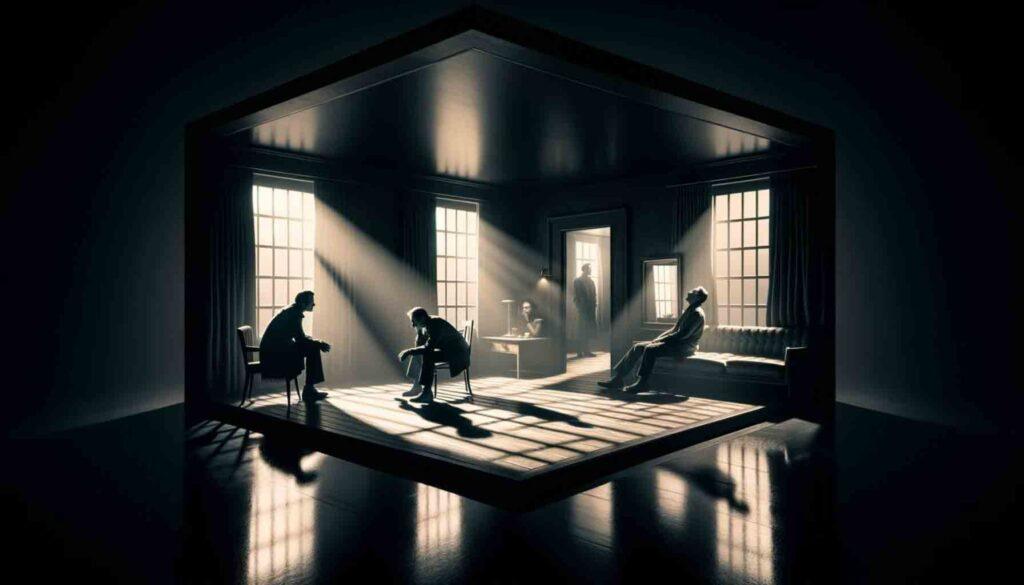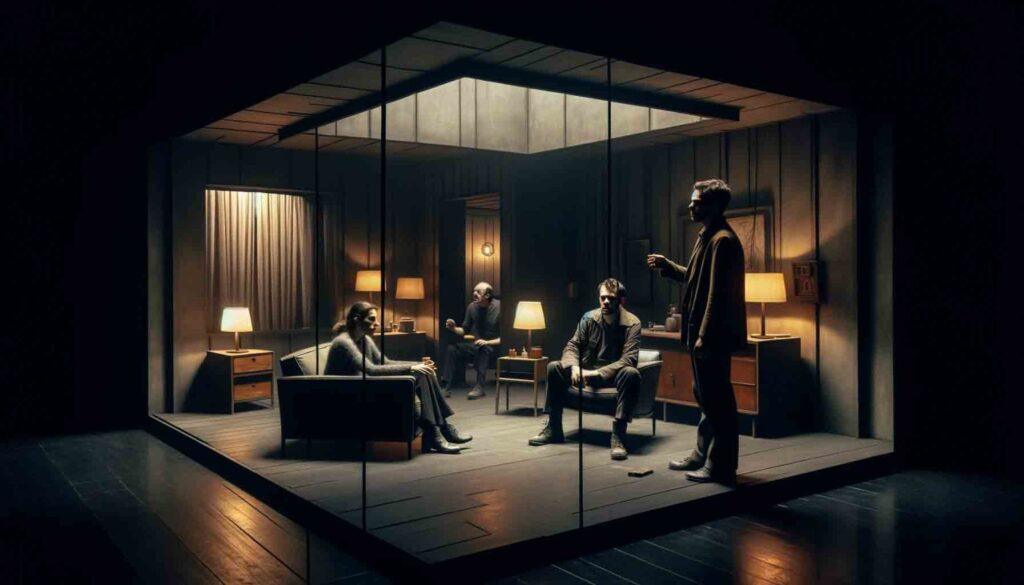Jean-Paul Sartre’s “No Exit” (“Huis Clos” in French), first performed in 1944, is an existentialist play that explores the human condition and the concepts of freedom, responsibility, and the self. The play, known for its famous line “Hell is other people,” presents a compelling case study in Sartre’s philosophy.
The Setting and Characters
“No Exit” unfolds in a single room, where three deceased characters are confined, revealing their true selves in their eternal interactions. Sartre masterfully uses this claustrophobic setting to dissect the human psyche.
Philosophical Underpinnings
The play encapsulates Sartre’s existentialist philosophy: “Man is condemned to be free; because once thrown into the world, he is responsible for everything he does.” The play reflects on the burden of this freedom and the inescapable gaze of others.

Comparison with Other Works
Sartre and Camus: A Philosophical Duel
“No Exit” is often compared to Albert Camus’s “The Stranger”, as both delve into existentialism. While Sartre focuses on interpersonal relationships and self-realization, Camus’s work centers on the absurdity of life and the indifference of the universe.
Contrasting Beckett’s “Waiting for Godot”
Samuel Beckett’s “Waiting for Godot” shares with “No Exit” the theme of existential despair. However, Beckett’s work emphasizes the futility and meaninglessness of life, contrasting with Sartre’s focus on self-deception and responsibility.
Echoes of Dostoevsky
Fyodor Dostoevsky’s “Notes from Underground” also resonates with “No Exit,” exploring the human condition and freedom. Both Sartre and Dostoevsky examine the complexities and paradoxes of human freedom and morality.

Perspectives from Critics and Scholars
The Literary Lens
Literary critics have hailed “No Exit” for its incisive look into the human soul. Harold Bloom remarked, “Sartre’s play remains one of the most profound modern explorations of the human condition.”
Philosophical Insights
Philosophers have both praised and critiqued Sartre’s existentialism. Simone de Beauvoir, Sartre’s contemporary and partner, saw “No Exit” as a crucial text in existentialist thought, stating, “It challenges us to confront and accept the responsibility of our freedom.”
Balanced Viewpoints
While some have criticized the play for its bleak outlook, most agree on its profound impact. As philosopher Friedrich Nietzsche might have said, “No Exit” confronts the abyss, forcing us to gaze into it, in turn, making the abyss gaze into us.
Comparing or contrasting Jean-Paul Sartre’s “No Exit” with the philosophy of Friedrich Nietzsche is an intriguing endeavor, as it delves into the heart of existentialist and post-Nietzschean thought.
Points of Contrast:
- Fundamental Philosophical Outlook: Nietzsche’s philosophy often centers around the concept of the “Übermensch” or “Overman,” a figure who creates their own values and meaning in a world viewed as inherently meaningless. In contrast, Sartre’s existentialism, as illustrated in “No Exit,” focuses more on the angst and despair arising from the human condition, the idea of being condemned to be free, and the responsibility that comes with that freedom. While Nietzsche promotes the idea of transcending human limitations and societal norms, Sartre emphasizes the inherent struggles within these limitations.
- Concept of Hell and Others: A central theme in “No Exit” is encapsulated in the famous line, “Hell is other people.” This concept contrasts with Nietzsche’s idea of self-overcoming and the emphasis on individual will. Sartre’s hell is one of eternal coexistence with others, where characters are forever trapped in relationships of conflict and recognition. Nietzsche, on the other hand, would likely see this as a failure to transcend beyond the superficial ties that bind individuals to societal norms and expectations.
Points of Comparison:
- Nihilism and Existentialism: Both Nietzsche and Sartre grapple with nihilism – the idea that life lacks intrinsic meaning or value. Nietzsche’s response to nihilism is the creation of personal values and the affirmation of life, despite its inherent meaninglessness. Sartre, similarly, emphasizes the importance of personal freedom and choice in a universe devoid of predetermined meaning.
- Critique of Traditional Morality: Both thinkers are critical of traditional morality. Nietzsche’s critique is more radical, proposing the reevaluation of all values and the creation of new ones. Sartre, particularly evident in “No Exit,” questions traditional moral and societal structures through the lens of personal responsibility and authenticity.
While Nietzsche and Sartre share a focus on individual existence and the rejection of intrinsic meanings or values, they diverge in their approaches to freedom, responsibility, and the role of others in shaping one’s existence. Nietzsche advocates for a radical revaluation and self-overcoming, whereas Sartre’s existentialism in “No Exit” reveals the conflicts and burdens inherent in freedom and interpersonal relationships.

Further Reading and Resources
- Explore More:
- Connect with the Philosophy:
- Purchase the Play:





